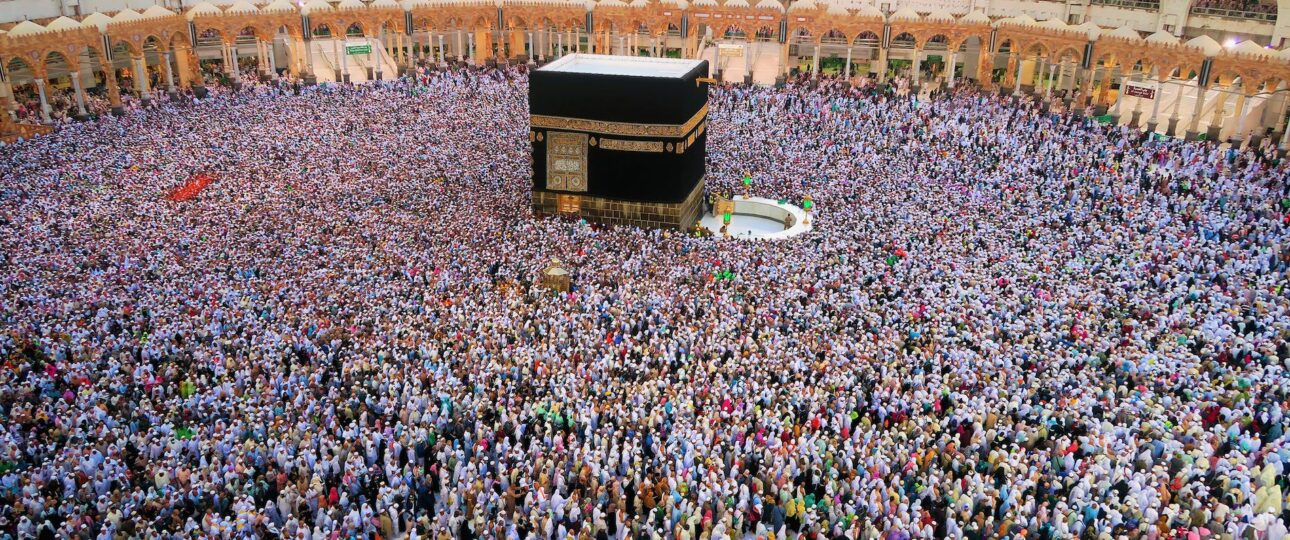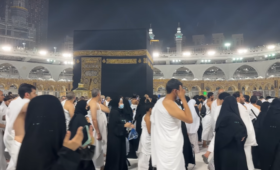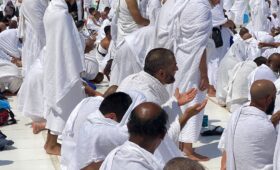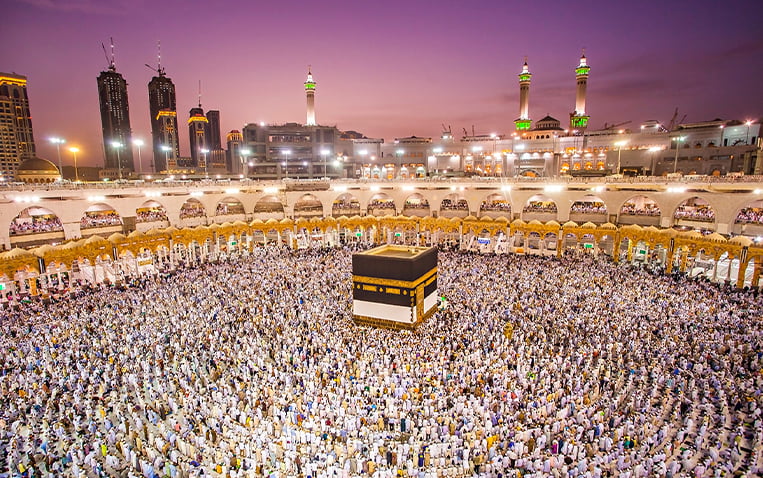Talbiyah comes from the Arabic verb “talaba,” which means to reply or answer. In the context of the Hajj and Umrah, it represents answering the call of Allah. Muslims who are starting the Hajj or Umrah pilgrimage recite the Talbiyah prayer.
After choosing to put on the Ihram, pilgrims say the Talbiyah prayer during the Hajj or Umrah. It is recited frequently by pilgrims as they travel. When wearing the Ihram at the beginning of the Hajj, pilgrims particularly recite the Talbiyah to help them focus on spiritual cleansing and separate from material concerns.
Importance of Talbiyah
It is necessary to say the Talbiyah after making your Niyyah for Umrah in order to declare your purpose and put yourself in the Ihram. Speaking the Talbiyah is seen as a Sunnah. It is required that you recite the Talbiyah at least once after deciding to perform Umrah; otherwise, the ritual will be deemed void.
Hajj pilgrims are advised to continue reciting the Talbiyah until they complete the stoning of Jamrah al-Aqaba on the 10th of Dhul Hijjah. It’s important to note that Talbiyah should be refrained from during Sa’ee or Tawaf. For Umrah pilgrims, the chanting of Talbiyah should be discontinued prior to the commencement of Tawaf.
Hadith
According to Jabir ibn Abdullah’s narration of the Prophet’s (peace be upon him) Hajj, “He started out by saying, “Labbayka Allahumma labbayk, labbayka la sharika laka labbayk.” La sharika lak, inna al-hamd, wal-ni’mata laka wal-mulk.” [Muslim].
Sahl bin Sa’d narrated that the Messenger of Allah ﷺ said:
“There is no Muslim who says the Talbiyah except that – on his right and left, until the end of the land, from here to there – the rocks, or trees, or mud say the Talbiyah.
[Narrated in Sunan al-Tirmidhi]
Translation of Talbiyah
لَبَّيْكَ اللهُمَّ لَبَّيْكَ—لَبَّيْكَ لَا شَرِيْكَ لَكَ لَبَّيْكَ—إِنَّ الْحَمْدَ وَالنِّعْمَةَ لَكَ وَالْمُلْكَ—لَا شَرِيْكَ لَكَ
Here I am, O Allah! Here I am—Here I am, You have no partner, here I am—Verily, all praise and thanks belong to You,Verily, all blessings belong to You,Verily, all sovereignty belongs to You—You have no partner
It is sunnah to recite Talbiyah in four parts as above.
When to Recite Talbiya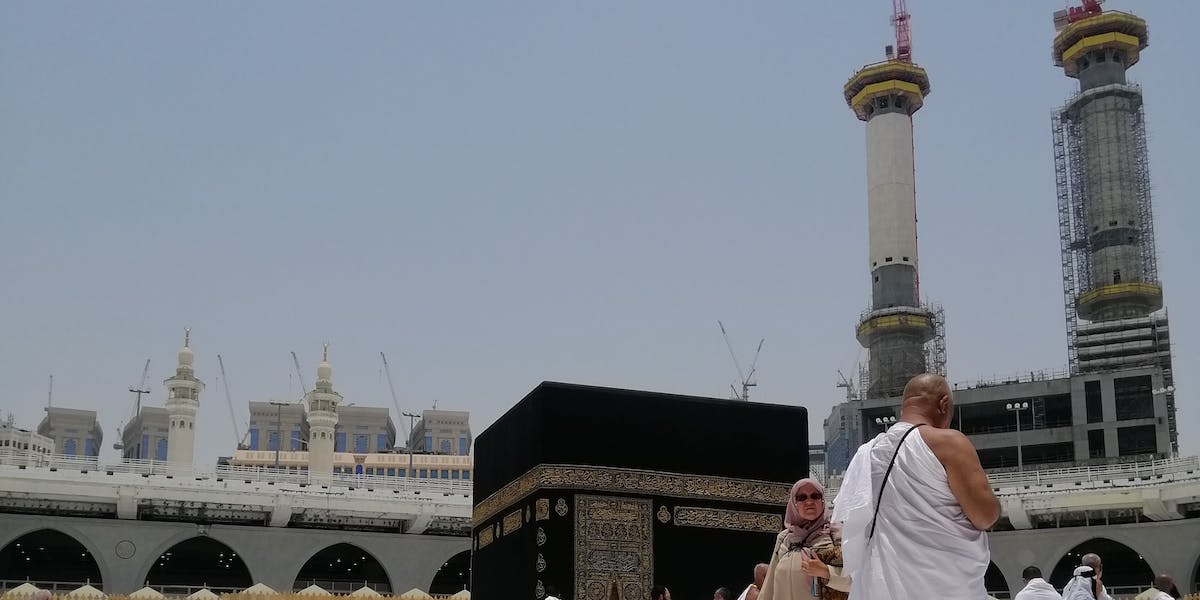
It is recommended to recite the Talbiyah during the whole Hajj and Umrah. It is advised to recite it in a variety of settings, including while sitting, standing, walking, traveling, sleeping down, experiencing small or severe impurities, and during menstruation.
It is also recommended to recite the Talbiyah at times of transition, such the change of day or night, morning, getting into or out of a car, running into other pilgrims, after Salah, and inside any mosque. It is advised to perform the Talbiyah three times or more. It’s crucial to remember that it shouldn’t be uttered during Sa’i or Tawaf.
It is recommended that Hajj pilgrims recite the Talbiyah continuously until Jamarah al-Aqaba is stoning on the 10th of Dhul Hijjah, or immediately before completing Tawaf al-Ziyarah if that occurs first. It is recommended that Umrah pilgrims finish the recitation right before starting the Umrah Tawaf.
Rules of Reciting Talbiyah for Men
Both the Hajj and the Umrah place great emphasis on reciting the Talbiyah, and males must follow certain rules when doing so:
- Communicate the Talbiyah with clarity and sincerity.
- Say it aloud enough for everyone in the vicinity to hear you.
- Continue reciting without stopping for the entire duration.
- After each time you pray, say the Talbiyah again.
Rules of Reciting Talbiyah for Women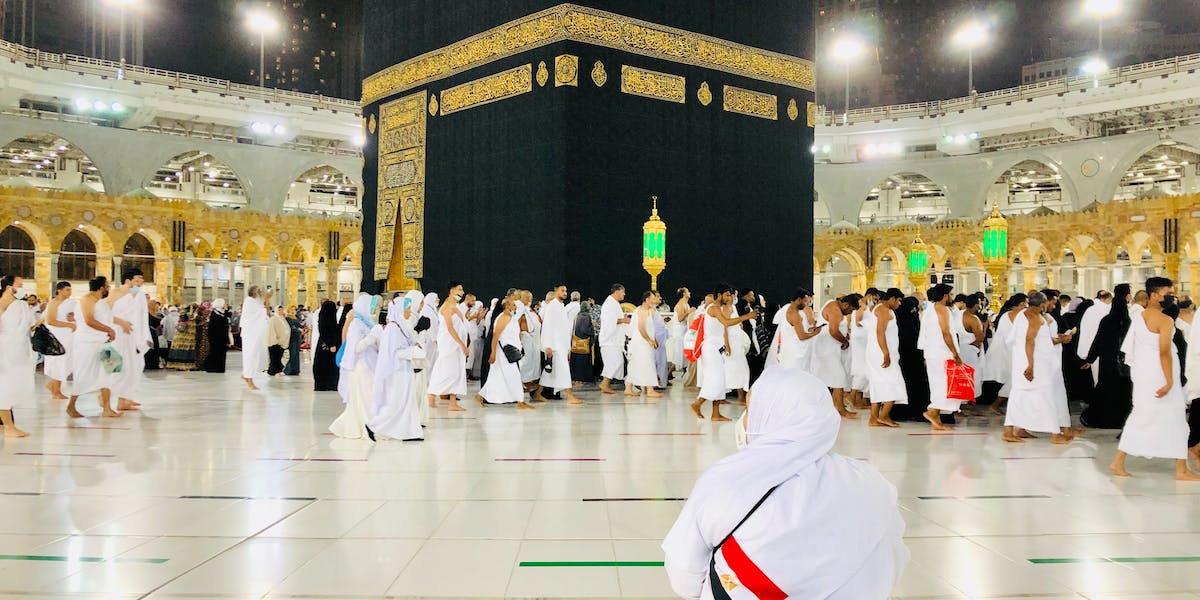
- There’s no issue if a woman raises her voice while reciting the Talbiyah, as long as she’s not in the presence of unrelated men.
- It’s suggested for women to recite the Talbiyah in a subdued manner.
- However, when a woman is menstruating or going through postnatal bleeding, it’s advised not to recite the Talbiyah aloud.
Conclusion
To sum up, the Talbiyah prayer is very important in the Hajj and Umrah pilgrimages since it represents a committed commitment to Allah’s command. When recited according to prescribed guidelines, it signifies a spiritual vow made on these hallowed travels. The Hadith highlights Talbiyah’s wide influence, resonating across the natural world.
Pilgrims are guided by the translation, suggested timing for recitation, and the text’s ongoing significance in diverse conditions. The constant singing of Talbiyah enhances the Hajj and Umrah rites and promotes a close relationship with God. Following the guidelines guarantees a peaceful and spiritually fulfilling pilgrimage experience for both men and women.
FAQ’s
Why is Talbiyah important?
The Talbiyah is a profound declaration affirming one’s obedience to Allah, acknowledging His oneness, and committing to abstain from associating partners with Him. It signifies a solemn promise to refrain from shirk and to solely seek assistance and surrender to Allah SWT.
When to stop Talbiyah in Umrah?
Upon reaching the Black Stone (al-Hajar al-Aswad), you have reached the beginning of the circumambulation (Tawaf), and it’s appropriate to stop reciting the Talbiyah. Now, you can express your intention (Niyyah) to perform Umrah with sincerity, saying, “O Allah, I engage in the Tawaf of Umrah to seek Your pleasure.”
When to stop talbiyah in hajj?
Hajj pilgrims are encouraged to continue reciting the Talbiyah until they complete the stoning of Jamrah al-Aqaba on the 10th of Dhul Hijjah. It’s important to note that during the activities of Sa’ee and Tawaf, the recitation of Talbiyah should be avoided.
When to read Talbiyah?
It is advised to recite the Talbiyah extensively during both Hajj and Umrah. This sacred prayer is recommended to be uttered in various circumstances, whether one is standing, sitting, walking, traveling in a vehicle, lying down, in a state of minor or major impurity, or even during menstruation. The emphasis lies on its continuous recitation in diverse situations throughout the pilgrimage experience.
When should I start Talbiyah for Umrah?
During Umrah, it is recommended to recite the Talbiyah from the moment one dons the Ihram until the commencement of Tawaf. For Hajj, the practice involves uttering the Talbiyah starting from Ihram until initiating the stoning of Jamrah Al-Aqaba on the Eid day.

